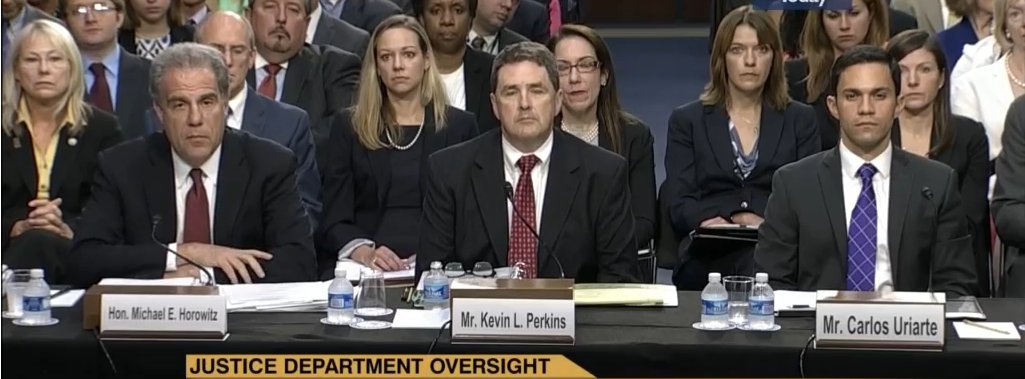An effective audit should be a strip search, not a cautious patdown. But federal agencies — including the FBI and other law enforcement groups — have begun to argue that they have the legal authority to declare certain records off-limits, even to inspectors general charged with detecting waste, fraud and abuse.
But the beancounters are fighting back.
Last week, Justice Department Inspector General Michael Horowitz told the Senate Judiciary Committee that his office requires complete access to agency information to carry out its mission.
“[O]ur office has faced numerous challenges to our access to department records, seriously impacting our ability to conduct oversight,” Horowitz said.
An accompanying letter from the Council of Inspectors General on Integrity and Efficiency, which Horowitz chairs, echoed concerns over access to government records.
“Without timely and unfettered access to all necessary information, Inspectors General cannot ensure that all government programs and operations are subject to exacting and independent scrutiny,” CIGIE wrote to the committee.
The Judiciary Committee called last week’s hearing in response to legal opinions issued by the Justice Department, which is leading the pushback on inspector general oversight. Last month, the Office of Legal Counsel determined that the Justice Department and its components — which include the FBI, the Drug Enforcement Administration and the US Marshals — may withhold certain records from the Office of the Inspector General.
Lawyers from the OLC found that other statutes trump the Inspector General Act and its mandate that agencies provide unfettered access to files as part of an inspector general investigation. Specifically, the OLC advised that Justice Department agencies may deem wiretap and grand jury records as too sensitive to hand over to the inspector general.
Such a determination is part of a broader resistance to inspector general review. The Justice Department inspector general reported last month that the DEA was uncooperative in a yearlong investigation of its confidential informants program, as were both the FBI and the DEA on an earlier investigation into sexual misconduct.
Senator Chuck Grassley (R - Iowa), who heads the Judiciary Committee, criticized the Justice Department for its stance that some documents are immune from review.
“If the Inspector General deems a document relevant to do his job, then the agency should turn it over immediately, without hesitation or review,” said Grassley in his opening statement.
Grassley and the community of inspectors general argue that the Justice Department is not following the letter of the law on inspector general authorities.
Upon signing the Inspector General Act of 1978, President Jimmy Carter classified the law as a “chance to protect the taxpayer’s dollar, to root out corruption, fraud, waste, mismanagement in the most effective and enthusiastic fashion.”
“I think it’s accurate to say that the American people are fed up with the treatment of American tax money in a way that involves fraud and mismanagement and embarrassment to the government,” quoth Jimmy a year before his “crisis of confidence” televised address in the summer of 1979.
“We’ve not yet completely succeeded in rooting out the embarrassing aspects of government management — or mismanagement,” the President summarized. “This bill will go a long way toward resolving that problem.”
While some federal agencies had an inspector general prior to 1978, the new law codified the responsibilities and authorities.
The Inspector General Act has been amended in the intervening decades to expand the number of inspectors general, but the central language of their authority remains: “to have access to all records, reports, audits, reviews, documents, papers, recommendations, or other material” necessary to assess whether federal agencies are upholding the public interest.
It’s baked into the federal code: “all records.” Lately, though, a handful of federal agencies have worked to undercut the access of their oversight investigators. Many of these agencies wield considerable power, but boast spotty track records on doing so responsibly.
The FBI has characterized its squabble with the Office of the Inspector General as a “good faith disagreement”. At last week’s hearing, an FBI official pointed to the agency’s provision of more nearly 400,000 pages of documents and 136,000 emails to the inspector general as part of audits and investigations.
But such cooperation is not laudable. It is a legal requirement. The FBI and all federal agencies must provide documents as requested by their respective inspector general’s office. The scope of IG investigations cannot be left to an agency’s interpretation or discretion.
The community of federal inspectors general is calling on Congress to enact legislation that further codifies this principle. The matter has broad bipartisan support, including from legislators that helped shape the architecture of federal inspectors general.
Retired Senator (and astronaut) John Glenn, who pushed to strengthen the authority of the CIA’s inspector general following the Iran-Contra scandal, wrote in favor of legislation to protect IG independence.
“Any action that would impair the IG’s ability to achieve their mission — particularly the denial of full and independent access to agency records and information — would have an immeasurable adverse impact and severely damage their critical oversight function,” Senator Glenn wrote to the House Committee on Homeland Security and Governmental Affairs in July.
Oversight requires access, and accountability mechanisms must trump secrecy to prevent abuse of power.
Watch the full hearing on C-Span.
Image via C-Span




